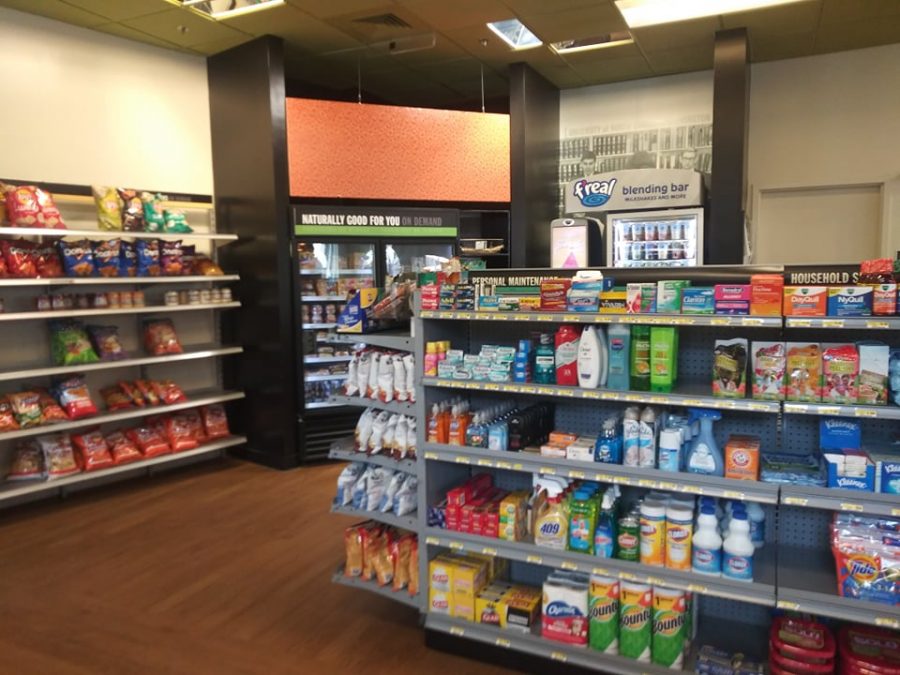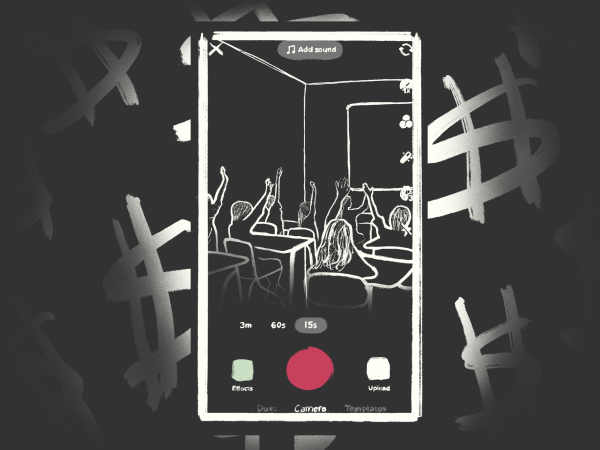The problem with food dollars and price gouging at the P.O.D.
UNC Wilmington notably has four convenience stores located around campus, each of which are known as the “P.O.D.” The four P.O.D.’s are located in the Fisher Student Union, the Hub, Seahawk Crossing and near Seahawk Landing, which is not listed at all UNCW’s campus dining site. These four stores are the only places on campus where students can buy milk, frozen dinners and kitchen essentials with their prime locations making them the most convenient places for students who are restricted to shopping on campus.
Freshmen or any student living in the dorms are required to get one of the two most expensive meal plans, the All Access 5, which is $1,950 a semester, or the All Access 7, which is $2,050, with different options available for students off-campus, including the ability to not have a meal plan at all. Meal plans consist of three basic components: unlimited swipes at two meal halls on campus, a select number of pre-paid meals at restaurants on campus, and finally, food dollars, which can best be explained as real money being turned into money that can only be spent on campus.
It is also important to note that the P.O.D. markets, along with the restaurants and vending machines on campus, are the only places students can spend food dollars. Food dollars are a component of two different meal plans for students. Students living on campus, primarily freshmen, are required to purchase food dollars as part of their meal plan. The All Access 5 comes with 150 food dollars while the All Access 7 comes with 250. These meal plans are created on a per-semester basis. It is also important to note that the only place food dollars can be spent off-campus is Papa Johns, meaning that they do not have any use beyond UNCW’s campus.
“What is the point of food dollars when that same money could just be in my pocket and used elsewhere,” asked Jack Casterella, a freshman senator and Vice-Chair of the Campus Services Committee.
On the other hand, Katie South of the meal plan office at UNCW has defended food dollars as something that is good for students.
“Food dollars are more of a convenience portion of your meal plan, they are great for grabbing a few items at the P.O.D Convenience stores or single items from retail locations,” wrote South.
Research by the Seahawk was conducted at the P.O.D. Market at Landing using a bar code scanner to compare the P.O.D. with prices at the local Walmart in Wilmington. Listed below is a chart with the scanned product on the left, the POD. Market’s price for the said product in the middle and Walmart on the right.
| Product | Price at the P.O.D. Market at Landing | Price at Walmart |
| Tampax Pearl, 18 Count | $7.99 | $3.83 |
| Midol Complete, Menstrual Period Symptoms Relief (16 Caplets) | $6.99 | $0.75 |
| Oscar Mayer Deli Oven Roasted Sliced Turkey Breast 9 oz. | $7.29 | $4.28 |
| NESQUIK Chocolate Milk 14 fl oz. bottle. | $3.19 | $1.36 |
| Visine Original. Eye Drops for Red Eyes | $6.99 | $3.24 |
| Hershey’s Milk Chocolate Syrup 24 oz. | $3.79 | $1.98 |
| Kellog’s Special K 12 oz. | $5.98 | $2.98 |
| Poptarts. Strawberry 8 count. | $3.89 | $1.94 |
Most items listed seem to be at least twice as much at the P.O.D. as they are at the local Walmart. But the largest price discrepancy was with a pack of 16 caplets of Midol, a popular over the counter medication for period relief, went from 75 cents at Walmart all the way up to $6.99 at the P.O.D, marking a 932 percent price increase.
Food dollars, not only encourage, but require students to spend money at these locations. Students on the same meal plans that give $150 a semester get five meals a week from any restaurant on campus, which means that most of these dollars are never going to be spent elsewhere. It is for this reason that the price difference could be seen as a concern, as well as the concept of mandatory food dollars for freshmen. Sure, some could argue that the P.O.D. is more expensive purely for convenience, but this does not explain why food dollars are mandatory. UNCW students are being trapped with food dollars, and one of their only places to spend it is the overpriced P.O.D. market. This money should just be in our pockets.
Have an opinion on food dollars and want to make your voice heard? Fill out the form here.








Virginia Spear • Jan 31, 2020 at 8:01 pm
We are teaching our next generation something. Maybe it’s greed
Justin Balderson • Jan 31, 2020 at 5:01 pm
I totally agree with Marissa’s comment above. The simple fact that you’re forced to hand-over money to the University so that they can turn it into a type of currency that only they accept is a totally useless and greedy attempt at the university ensuring that they take as much money from students as they can. If students want to eat on campus they should be allowed to do that on their own free will, if they’d like to eat off campus that shouldn’t be frowned upon. Forcing students to pay the college an upfront amount of money for a variable amount of food is depriving kids of their freedom in a sense. Not to mention that the parking situation is already out of control and UNCW already charges WAYYYYY too much money for a parking spot that can be as far as half a mile off campus. I’m glad I grew up here so that I don’t have to buy in to this communistic hierarchy of charges and fees that empty the poor pockets of students who are already tens of thousands of dollars in debt to UNCW in the first place. I park 2 miles off campus and walk everyday just to dodge the ridiculous parking permit fees that are outrageously expensive. I didn’t buy a food plan because thankfully it isn’t required for students living off-campus. With mandates such as these that UNCW has put into place to screw students out of even more money gives me no incentive to support anything more than solely paying tuition for classes. I go out of my way to make sure I don’t give a cent more to UNCW than I absolutely have to in order to get my degree. These terrible excuses of ideas they call “meal plans” and “food dollars” are the reason I have no respect for UNCW or like-minded institutions. I respect all my teachers, advisors, and the faculty that have no part in the implementation of these money grubbing pyramid schemes. As for those such as Kate South who was quoted in the article above, I have no respect for people like that. People who can sit back and vouch for a mandatory conversion of $1000-$2000 Of students money to be turned into useless, functionless, worthless currency that is good to no one else and cannot be rolled over into another semester or credited back to a student’s account is a total rip-off, a clear exploitation of a mass of people who are already tremendously in debt, and is just plain fraud. So to sum up my stance on this subject, I do not hold any respect for anyone, including Ms. Kate South, or anyone else in charge of, or who agree with this pointless burglary of money from students by the University. None. Not a single ounce of respect for anyone of them. This is coming from a student that wasn’t even affected by this problem. I’m just an intermediary voice looking at the issue with a fair and just and unbiased view.
Jack Casterella • Jan 31, 2020 at 1:43 pm
Hey everyone, Senator Jack Casterella here — if you have any concerns or want to make your voice heard, please shoot me an email at [email protected]. I’m here to serve you — I can’t do my job without your input!
Miles Walker • Jan 31, 2020 at 1:36 pm
I have always thought the POD prices were way higher than anywhere else. It is a great and very convenient store but I rarely take advantage of it because of the outrageous prices. Students would rather drive a minute off campus to a grocery store to get better prices and that is not right. Students shouldn’t have to leave the comfort and safety of the UNCW campus just go get a quick cheap snack.
Marissa Barer • Jan 31, 2020 at 12:05 pm
Food dollars uphold the money hungry industry that has risen from college campuses. Petty mandates like this keep socioeconomically challenged students barred from accessibility to education.